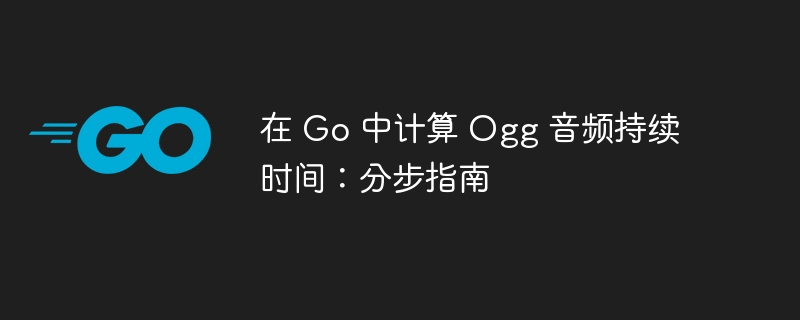在 Go 中计算 Ogg 音频持续时间:分步指南
来源:dev.to
时间:2024-09-09 10:39:50 391浏览 收藏
IT行业相对于一般传统行业,发展更新速度更快,一旦停止了学习,很快就会被行业所淘汰。所以我们需要踏踏实实的不断学习,精进自己的技术,尤其是初学者。今天golang学习网给大家整理了《在 Go 中计算 Ogg 音频持续时间:分步指南》,聊聊,我们一起来看看吧!

我试图克隆不和谐,我发现他们使用 ogg 格式的音频(我认为),我试图将音频持续时间存储在数据库中。
关于获取 ogg 音频持续时间的 stackoverflow 解决方案,我发现很有趣。该方法包括查找文件末尾,找到最后一个 ogg 页头,并读取其颗粒位置。
func getOggDurationMs(reader io.Reader) (int64, error) {
// Read the entire Ogg file into a byte slice
data, err := io.ReadAll(reader)
if err != nil {
return 0, fmt.Errorf("error reading Ogg file: %w", err)
}
// Search for the "OggS" signature and calculate the length
var length int64
for i := len(data) - 14; i >= 0 && length == 0; i-- {
if data[i] == 'O' && data[i+1] == 'g' && data[i+2] == 'g' && data[i+3] == 'S' {
length = int64(readLittleEndianInt(data[i+6 : i+14]))
}
}
// Search for the "vorbis" signature and calculate the rate
var rate int64
for i := 0; i < len(data)-14 && rate == 0; i++ {
if data[i] == 'v' && data[i+1] == 'o' && data[i+2] == 'r' && data[i+3] == 'b' && data[i+4] == 'i' && data[i+5] == 's' {
rate = int64(readLittleEndianInt(data[i+11 : i+15]))
}
}
if length == 0 || rate == 0 {
return 0, fmt.Errorf("could not find necessary information in Ogg file")
}
durationMs := length * 1000 / rate
return durationMs, nil
}
func readLittleEndianInt(data []byte) int64 {
return int64(uint32(data[0]) | uint32(data[1])<<8 | uint32(data[2])<<16 | uint32(data[3])<<24)
}
我决定在这里分享它,我发现这个实现非常酷,也许可以帮助其他人
本篇关于《在 Go 中计算 Ogg 音频持续时间:分步指南》的介绍就到此结束啦,但是学无止境,想要了解学习更多关于Golang的相关知识,请关注golang学习网公众号!
声明:本文转载于:dev.to 如有侵犯,请联系study_golang@163.com删除
相关阅读
更多>
-
505 收藏
-
503 收藏
-
502 收藏
-
502 收藏
-
502 收藏
最新阅读
更多>
-
267 收藏
-
328 收藏
-
382 收藏
-
262 收藏
-
303 收藏
-
333 收藏
-
262 收藏
-
382 收藏
-
292 收藏
-
113 收藏
-
150 收藏
-
122 收藏
课程推荐
更多>
-

- 前端进阶之JavaScript设计模式
- 设计模式是开发人员在软件开发过程中面临一般问题时的解决方案,代表了最佳的实践。本课程的主打内容包括JS常见设计模式以及具体应用场景,打造一站式知识长龙服务,适合有JS基础的同学学习。
- 立即学习 543次学习
-

- GO语言核心编程课程
- 本课程采用真实案例,全面具体可落地,从理论到实践,一步一步将GO核心编程技术、编程思想、底层实现融会贯通,使学习者贴近时代脉搏,做IT互联网时代的弄潮儿。
- 立即学习 516次学习
-

- 简单聊聊mysql8与网络通信
- 如有问题加微信:Le-studyg;在课程中,我们将首先介绍MySQL8的新特性,包括性能优化、安全增强、新数据类型等,帮助学生快速熟悉MySQL8的最新功能。接着,我们将深入解析MySQL的网络通信机制,包括协议、连接管理、数据传输等,让
- 立即学习 500次学习
-

- JavaScript正则表达式基础与实战
- 在任何一门编程语言中,正则表达式,都是一项重要的知识,它提供了高效的字符串匹配与捕获机制,可以极大的简化程序设计。
- 立即学习 487次学习
-

- 从零制作响应式网站—Grid布局
- 本系列教程将展示从零制作一个假想的网络科技公司官网,分为导航,轮播,关于我们,成功案例,服务流程,团队介绍,数据部分,公司动态,底部信息等内容区块。网站整体采用CSSGrid布局,支持响应式,有流畅过渡和展现动画。
- 立即学习 485次学习

